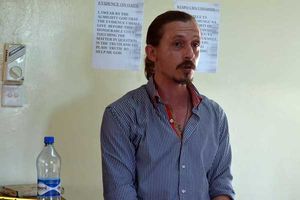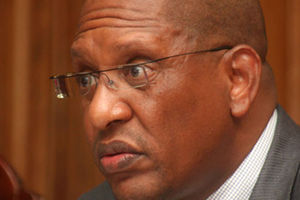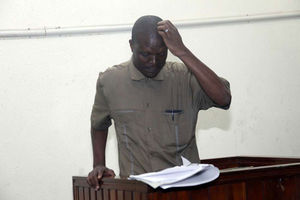
Harry Veevers, 64, from Rochdale, UK died at his home in Kenya in 2013.
After emigrating and settling in Kenya in the 1980s, Harry Roy Veevers, a property developer from Rochdale in Greater Manchester, UK, and already a successful businessman, also invested heavily in Mombasa.
His eldest son, Richard John Veevers, describes the British tycoon as a business magnate who was shrewd with his money and hardly spent a penny on non-essential items.
"He worked within his budget. He would rather buy property than carelessly spend his money on something off his plan. He will never give out his money. He did not like wasteful spending," said Richard.

Richard John Veevers, the eldest son of the late Briton Harry Roy Veevers who died mysteriously at his residence in Mombasa in 2013 testifies at the Mombasa Law Court during an inquest into his fathers death on November 28, 2016.
Although he kept some of his money in the bank, his son said that Roy had a special safe deposit box where he kept his passport and money in sterling pound currency.
"He also had a bank account where he kept his money but another set of cash would be in the special deposit box, where he also kept many of his useful documents," Richard said.
It is alleged that this box was deposited in a bank but was later found to be empty.
Roy is also said to have had a safe in his bedroom where he kept an additional amount of money.
“In England, we used to call our father a miser. He didn’t like to spend money. That is how he kept his money. If you met him in the street you wouldn’t believe he was a millionaire because he didn’t give that impression,” Richard said.
The businessman was also protective of his possessions, to the extent that his children didn't dare drive his car.
Until his death, his father suffered from high blood pressure, which was alleviated by the Kenyan climate, and other minor health problems.
"My father was a fit and healthy 64-year-old man. His hobbies were swimming, tennis and windsurfing," he said.
According to Richard, his father bought most of the properties in Kenya in 2003.
Before moving to Kenya, Richard said his father had sold some of his properties in the UK.

Richard John Veevers (right) and his brother Philip Veevers (left) listen attentively during the inquest into the death of their father Harry Roy Veevers at the Mombasa Law Courts on May 4, 2017.
From 2006, Roy spent most of his time in Kenya.
"My father liquidated the UK assets between 2000 and 2003. Then, when in the UK, he stayed with his mother in Dorchester," he said.
He was a family man, Richard added.
Roy came to Kenya with his British wife Azra Parveen Din, whom he married in England after divorcing his first wife, Florence Marvis.
He had three children with Florence, including two sons – Richard and Philip Veevers – who kept in touch with their father even after he divorced their mother and moved to Kenya.
“I visited my father in Kenya often. We were on good terms and he would tell me a lot of things,” Richard said.
In Kenya, Roy had two daughters with his Muslim wife Parveen – Alexandra and Hellen Veevers. Roy and Parveen lived happily in Mombasa until February 14, 2013, when tragedy struck.

Prosecutor Alexander Muteti (left) interrogates Alexandra Veevers during an inquest into the death of her father, Harry Veevers, at the Mombasa Law Courts on May 2, 2017.
On that Valentine’s Day, the British tycoon died in his bed at his home in Nyali, Mombasa County. His children from both his first and second marriages were in the UK at the time of his death. Richard, Philip, Alexandra and Hellen flew to Kenya on the same flight from the UK after hearing of their father's sudden death.
Roy was quickly buried in a Muslim cemetery without a post-mortem to determine the cause of his death. His wife, Parveen, said he had died of natural causes.
But his death caused a rift between his sons and daughters. Richard and Philip accused their half-sisters and mother of poisoning their father, claiming his life was cut short to prevent him marrying a third wife and to secure his $7 million fortune.
The dispute led to a 10-year inquest, which failed to produce any concrete evidence of criminal responsibility for his death.
The report on the examination of tissue and soil samples presented to the court during the inquest produced conflicting results.
Eleven months after Roy's burial, his body was exhumed for post-mortem examination.
The businessman's estate remains unresolved as Roy is believed to have died without leaving a will. A note he allegedly wrote explaining his final wishes was not found in the bank safe deposit box where it was supposed to be kept.










